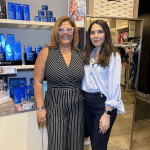Overcoming roadblocks in her youth and holding onto her sense of creativity, she chased her dreams and realized her greatest potential.
Lyn Ross, L.M.E., is the founder of Institut’ DERMed Clinical Skin Care and the College of Advanced Aesthetics. Her philosophy is that education is life long and knowledge is a powerful tool. Lyn did not always think that way! As a child growing up in the ‘60s, she had trouble with reading, writing, and other structured, academic-related tasks. Being a high creative processor, she did not make good grades in school – in those days there were no programs like those found today for learning through self-realization.
However, creativity works in mysterious ways and often includes tenacity and resilience as guiding forces. Because a future academic pathway was closed to Lyn at the time, she pursued a job instead. This led to her working in cosmetic sales where she soon excelled at connecting with clients and was highly praised for her makeup stylings. She also discovered that she loved helping women to look and feel their best and, as a result, her confidence soared.
Like most creative people, Lyn also thrived on pursuing new experiences. At age 24, when the opportunity presented itself for her to own an iNatural Cosmetics Boutique, she did not hesitate. This 500-square-foot shop is where her bigger dream of providing therapeutic, hands-on facial and body treatments evolved. Lyn’s strong desire to help clients solve problematic skin conditions would lead her to opening the very first medical spa in the southeast in 1989. Lyn was on her way to becoming a world renowned, professional beauty therapist.
Realizing that changing skin required more specialized product formulas, Lyn created and launched her first glycolic acid products in 1994. Now known as Institut’ DERMed Clinical Skincare, her line of cosmeceuticals expanded to target aging, acne, hyperpigmentation, and sensitive skin conditions with optimal results. This company growth would not be without many challenges and some failures, as Lyn sought to balance existing operations, as well as manage expansion into wholesale product distribution.
It was these very failures that brought Lyn to the realization that she knew everything about working in her business and little about working the business by the numbers. Not being one to take failure personally, she consulted with experts to help her recognize and move past where she was stuck. This drive to learn the art of business generated new ideas about human resources and building a team of talented operations, marketing, and sales staff.
A very successful entrepreneur and business owner now for over 40 years, Lyn believes that when one teaches, they learn more deeply. She founded the College of Advanced Aesthetics in 1995 to teach licensed aestheticians the advanced skin care protocols and technology treatments used in a clinical setting. Along with skills training, the Lyn Ross Business Mastermind courses offer a resource for spa owners experiencing the loneliness of owning a small business.
WHAT THEY’RE SAYING ABOUT LYN
“As an Institut’ DERMed brand ambassador, I know I would not be the aesthetician I am today without the training and on-going support of Lyn Ross. Her dedication to education is second to none.” Christine Miller, L.E., Scott Miller Salon and Spa

















0 Comments